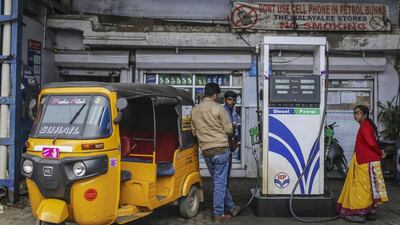Bracing for a future with less-polluting fuels, Indian oil refiner Hindustan Petroleum is planning a pilot programme for swapping batteries of electric two- and three-wheelers at its outlets by December, according to people familiar with the matter.
The initiative is aimed at helping the company maintain its grip on a segment of the mobility market that’s rapidly shifting to cleaner power sources, said the people, who asked not to be identified because the plans aren’t public. The ultimate capacity of the programme hasn’t been decided.
A Hindustan Petroleum spokesman wasn’t immediately able to comment.
Two- and three-wheelers account for about two-thirds of Hindustan Petroleum's gasoline sales, said the people. Those two types of vehicles now make up more than 80 per cent of all autos on Indian roads, according to BloombergNEF – a leading provider of primary research on clean energy, advanced transport, digital industry, innovative materials and commodities.
Their electric versions have achieved parity with gasoline vehicles in terms of total cost of ownership and are expected to lead electrification of transport in India, according to BNEF’s latest electric vehicle outlook.
The swap programme, which will take place in the city of Thane in India’s western Maharashtra state, will allow consumers to replace depleted batteries with fully charged ones in just a few minutes. That’s a quicker option for motorists than recharging the battery themselves, which can take several hours.
The pilot is among several Hindustan Petroleum initiatives to cater to electric vehicles, which include charging stations at seven of its retail outlets as of March and a plan to work with Tata Power to set up more. The speed of adaption of electric vehicles and consumers’ changing fuel preferences may be a risk to the motor fuel business, Hindustan Petroleum said in its annual report.
Indian startups including Sun Mobility and Lithion Power are currently providing battery swapping services for two- and three-wheelers and some buses. Last year, Finnish utility Fortum Oyj’s India unit and Sweden’s Clean Motion launched a battery swapping pilot near New Delhi.
Hindustan Petroleum also isn’t the only Indian fossil fuel-focussed company adapting to the influx of electric vehicles amid the transition to cleaner power. State-run Bharat Heavy Electricals has also announced plans to set up electric vehicle chargers.

